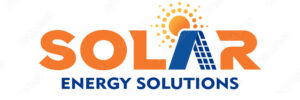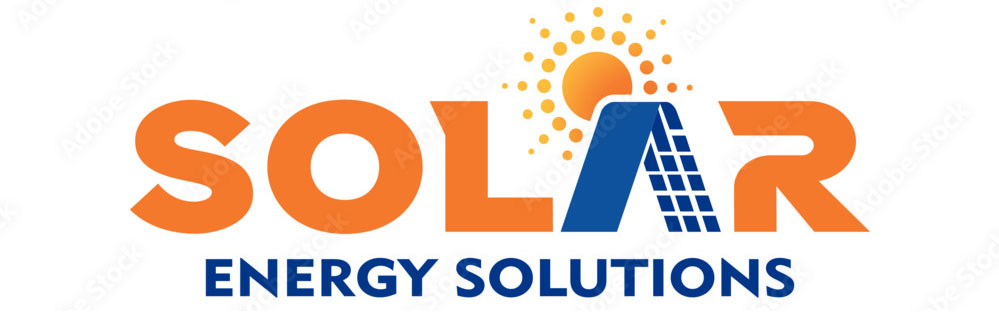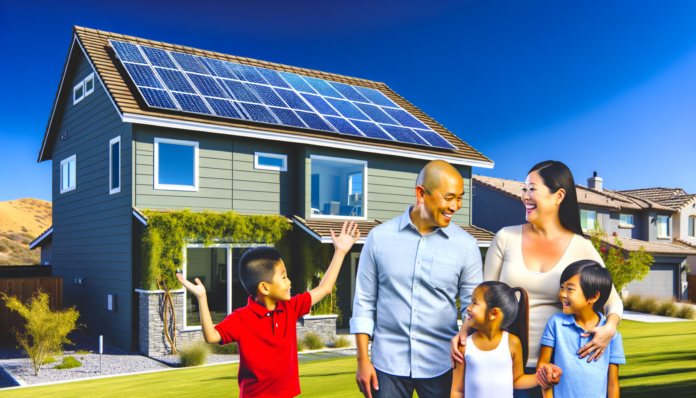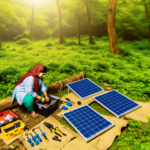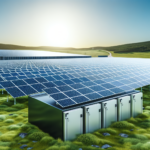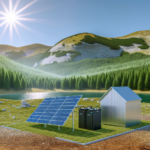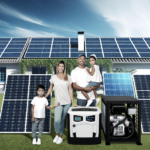Introduction to Solar Power Systems
What is Solar Power?
Solar power is a renewable and sustainable source of energy derived from the sun’s rays. It is harnessed using photovoltaic (PV) systems, which convert sunlight into electricity. The process begins with solar panels absorbing sunlight, which is then transformed into direct current (DC) electricity. This DC electricity is subsequently converted into alternating current (AC) electricity by an inverter, making it suitable for use in homes and businesses. The efficiency of solar panels, typically ranging between 17% to 19%, depends on factors such as panel type, placement, and environmental conditions.
Benefits of Solar Power
Adopting solar power offers numerous advantages, both for individuals and the environment. Here are some key benefits:
- Cost Savings: Solar power can significantly reduce electricity bills. By generating your own electricity, you become less reliant on the grid, which can lead to substantial savings over time.
- Environmental Impact: Solar energy is a clean and renewable resource. It reduces greenhouse gas emissions and reliance on fossil fuels, contributing to a healthier planet.
- Energy Independence: Solar power provides a degree of energy independence. By producing your own electricity, you are less affected by fluctuations in energy prices and supply disruptions.
- Increased Property Value: Homes equipped with solar power systems often see an increase in property value. Potential buyers are attracted to the prospect of lower energy costs and a reduced carbon footprint.
- Government Incentives: Many governments offer incentives, such as tax credits and rebates, to encourage the adoption of solar energy. These incentives can significantly offset the initial installation costs.
Why Consider Solar Power for Your Lifestyle?
Integrating solar power into your lifestyle can offer a range of benefits tailored to your specific needs and values. Here are a few reasons why you might consider making the switch:
- Environmental Responsibility: If you are committed to reducing your carbon footprint and promoting sustainability, solar power is an excellent choice. It allows you to generate clean energy and reduce your reliance on fossil fuels.
- Financial Savings: Over time, the cost savings on your electricity bills can be substantial. Additionally, government incentives can make the initial investment more affordable.
- Energy Security: Solar power can provide a reliable source of energy, especially in areas prone to power outages or where the grid is unreliable. This is particularly beneficial for those living in remote locations.
- Technological Advancements: The solar industry is continually evolving, with advancements in panel efficiency and energy storage solutions. By adopting solar power, you can take advantage of the latest technologies and innovations.
- Increased Home Value: Installing a solar power system can increase the value of your property. Prospective buyers are often willing to pay a premium for homes with lower energy costs and a reduced environmental impact.
In summary, solar power is a versatile and beneficial energy solution that can align with various lifestyles and values. Whether you are motivated by environmental concerns, financial savings, or energy security, solar power offers a compelling option for a sustainable future.
Types of Solar Power Systems
Grid-Tied Solar Systems
Grid-tied solar systems are the most common type of solar power system. These systems are connected to the local utility grid, allowing homeowners to use solar power during the day and draw power from the grid when their solar panels are not producing enough energy. One of the significant advantages of grid-tied systems is the ability to sell excess power back to the grid through a process known as net metering. This can result in substantial savings on electricity bills, as homeowners receive credits for the surplus energy they generate.
**Pros:**
– Lower initial cost compared to off-grid systems.
– Ability to sell excess energy back to the grid.
– Reduced electricity bills through net metering.
**Cons:**
– Dependence on the utility grid for power during non-sunny periods.
– Not suitable for remote areas without grid access.
Off-Grid Solar Systems
Off-grid solar systems are entirely independent of the utility grid. These systems are designed to provide energy self-sufficiency, making them ideal for remote locations where connecting to the grid is not feasible. Off-grid systems typically include a battery storage system to store excess energy generated during sunny periods for use during the night or cloudy days.
**Pros:**
– Complete energy independence from the grid.
– Ideal for remote or rural areas.
– Reduced carbon footprint by relying solely on renewable energy.
**Cons:**
– Higher initial cost due to the need for battery storage.
– Requires careful management of energy consumption and storage.
– Limited power supply during extended periods of low sunlight.
Hybrid Solar Systems
Hybrid solar systems combine the features of both grid-tied and off-grid systems. These systems are connected to the utility grid but also include a battery storage system for backup power during outages. Hybrid systems offer the best of both worlds, providing the convenience of grid-tied systems with the security of off-grid systems.
**Pros:**
– Backup power during grid outages.
– Ability to sell excess energy back to the grid.
– Greater energy self-sufficiency compared to grid-tied systems alone.
**Cons:**
– Higher initial cost due to the inclusion of battery storage.
– Limited battery capacity may not cover extended outages.
Portable Solar Power Systems
Portable solar power systems are designed for mobility and convenience. These systems typically include portable solar panels, a battery, a battery charger, and an inverter, all integrated into a single device. Portable solar systems are ideal for outdoor enthusiasts, campers, and those who need a reliable power source on the go.
**Pros:**
– Highly portable and easy to set up.
– Ideal for camping, boating, and emergency situations.
– Provides a renewable power source in remote locations.
**Cons:**
– Limited power capacity compared to permanent installations.
– May not be suitable for powering large appliances or high energy demands.
In conclusion, the type of solar power system that best fits your lifestyle depends on your specific energy needs, location, and preferences. Whether you seek energy independence, backup power, or a portable solution, there is a solar power system that can meet your requirements.
Assessing Your Solar Power Needs
Evaluating Your Energy Consumption
Understanding your energy consumption is the first step in determining the right solar power system for your needs. Start by reviewing your past electricity bills to get a sense of your average monthly and annual energy usage. Look for patterns in your consumption, such as higher usage during certain seasons or times of day. This will help you identify your peak energy demands.
To get a more detailed picture, consider the following steps:
- Identify Major Energy Consumers: List out the major appliances and devices in your home, such as HVAC systems, refrigerators, and washing machines. Note their wattage and how often they are used.
- Calculate Daily Usage: Multiply the wattage of each appliance by the number of hours it is used per day to get the daily energy consumption in watt-hours (Wh). Sum these values to get your total daily energy usage.
- Project Future Needs: Consider any future changes that might affect your energy consumption, such as adding new appliances or an electric vehicle.
By understanding your current and future energy needs, you can better determine the size and type of solar power system that will best meet your requirements.
Determining Your Solar Power Goals
Once you have a clear understanding of your energy consumption, the next step is to define your solar power goals. These goals will guide your decision-making process and help you choose the most suitable solar power system.
Consider the following questions:
- Energy Independence: Do you want to be completely independent from the grid, or are you comfortable with a system that supplements your grid power?
- Cost Savings: Are you primarily interested in reducing your electricity bills, or are you also looking to take advantage of incentives and rebates?
- Environmental Impact: How important is reducing your carbon footprint and contributing to a sustainable future?
- Backup Power: Do you need a system that provides backup power during outages, or is continuous power supply not a critical concern?
By clearly defining your goals, you can narrow down your options and focus on the solar power systems that align with your lifestyle and priorities.
Considering Your Geographic Location
Your geographic location plays a crucial role in the effectiveness of your solar power system. Factors such as sunlight availability, weather patterns, and local regulations can significantly impact the performance and feasibility of your solar installation.
Here are some key considerations:
- Sunlight Availability: The amount of sunlight your location receives directly affects the energy output of your solar panels. Use solar maps or online tools to estimate the average peak sun hours in your area.
- Weather Patterns: Frequent cloud cover, rain, or snow can reduce the efficiency of your solar panels. Consider how seasonal weather variations might impact your energy production.
- Roof Orientation and Shading: The orientation and angle of your roof, as well as any shading from trees or nearby buildings, can affect the amount of sunlight your panels receive. Ideally, your roof should face south and have minimal shading.
- Local Regulations: Check local building codes, zoning laws, and utility policies regarding solar installations. Some areas may have restrictions or offer incentives that can influence your decision.
By taking these geographic factors into account, you can optimize the placement and performance of your solar power system, ensuring it meets your energy needs effectively.
Choosing the Right Solar Power System for Your Lifestyle
For Outdoor Enthusiasts and Adventurers
For those who love the great outdoors, portable solar power systems are a game-changer. These systems are designed to be lightweight, compact, and easy to transport, making them perfect for camping, hiking, and other outdoor activities. Portable solar panels can charge essential devices like smartphones, GPS units, and even small appliances, ensuring you stay connected and powered up no matter where your adventures take you.
**Key Features:**
– **Portability:** Lightweight and foldable designs for easy transport.
– **Versatility:** Can charge a variety of devices.
– **Durability:** Built to withstand outdoor conditions.
**Ideal For:**
– Campers
– Hikers
– RV travelers
– Boaters
For Off-Grid Living
If you’re looking to live independently from the utility grid, an off-grid solar power system is your best bet. These systems are designed to provide all the electricity you need, storing excess energy in batteries for use during cloudy days or at night. Off-grid systems are perfect for remote locations where connecting to the grid is not feasible.
**Key Features:**
– **Energy Independence:** Complete autonomy from the utility grid.
– **Battery Storage:** Stores excess energy for later use.
– **Scalability:** Can be expanded as your energy needs grow.
**Ideal For:**
– Remote cabins
– Rural homes
– Tiny houses
– Eco-villages
For Emergency Preparedness
In times of natural disasters or power outages, having a reliable source of electricity can be a lifesaver. Hybrid solar power systems, which combine grid-tied and off-grid capabilities, are excellent for emergency preparedness. These systems can operate independently of the grid when necessary, thanks to their battery storage, ensuring you have power when you need it most.
**Key Features:**
– **Reliability:** Provides power during grid outages.
– **Battery Backup:** Stores energy for emergencies.
– **Flexibility:** Can switch between grid-tied and off-grid modes.
**Ideal For:**
– Urban homes
– Disaster-prone areas
– Emergency shelters
– Critical infrastructure
For Sustainable Living
For those committed to reducing their carbon footprint and living sustainably, grid-tied solar power systems are an excellent choice. These systems allow you to generate your own electricity while remaining connected to the utility grid. Excess energy can be fed back into the grid, often earning you credits through net metering. This not only reduces your electricity bills but also supports a cleaner, more sustainable energy grid.
**Key Features:**
– **Cost-Effective:** Lower initial costs compared to off-grid systems.
– **Net Metering:** Earn credits for excess energy produced.
– **Environmental Impact:** Reduces reliance on fossil fuels.
**Ideal For:**
– Urban and suburban homes
– Environmentally conscious individuals
– Businesses looking to reduce operational costs
– Community solar projects
Choosing the right solar power system depends on your specific needs and lifestyle. Whether you’re an outdoor enthusiast, living off the grid, preparing for emergencies, or committed to sustainable living, there’s a solar power system that fits your lifestyle perfectly.
Installation and Maintenance of Solar Power Systems
DIY vs. Professional Installation
When it comes to installing a solar power system, you have two primary options: DIY installation or hiring a professional. Each approach has its own set of advantages and considerations.
DIY Installation:
- Cost Savings: One of the main benefits of DIY installation is the potential for cost savings. By doing the work yourself, you can avoid labor costs associated with professional installation.
- Learning Experience: Installing your own solar power system can be a rewarding learning experience, giving you a deeper understanding of how the system works.
- Flexibility: DIY installation allows you to work at your own pace and schedule, which can be convenient if you have other commitments.
Professional Installation:
- Expertise: Professional installers have the experience and knowledge to ensure that your system is installed correctly and efficiently. They can handle complex tasks such as electrical wiring and system integration.
- Warranty and Support: Many professional installations come with warranties and ongoing support, providing peace of mind in case any issues arise.
- Compliance: Professionals are familiar with local regulations and building codes, ensuring that your installation meets all necessary requirements.
Ultimately, the choice between DIY and professional installation depends on your budget, technical skills, and comfort level with handling electrical components.
Basic Maintenance Tips
Maintaining your solar power system is crucial for ensuring its longevity and efficiency. Here are some basic maintenance tips to keep your system running smoothly:
- Regular Cleaning: Dust, dirt, and debris can accumulate on solar panels, reducing their efficiency. Clean the panels with water and a soft brush or cloth every few months, or more frequently if you live in a particularly dusty area.
- Inspect for Damage: Periodically inspect your solar panels and other system components for any signs of damage, such as cracks, loose connections, or corrosion. Address any issues promptly to prevent further damage.
- Monitor Performance: Use a monitoring system to keep track of your solar power system’s performance. This can help you identify any drops in efficiency or potential issues that need attention.
- Check Inverter: The inverter is a critical component of your solar power system. Ensure that it is functioning correctly by checking the display for any error messages or unusual readings.
- Trim Nearby Vegetation: Ensure that trees or other vegetation do not cast shadows on your solar panels, as shading can significantly reduce their efficiency. Trim any overhanging branches as needed.
Troubleshooting Common Issues
Even with regular maintenance, you may encounter some common issues with your solar power system. Here are a few troubleshooting tips:
- Low Power Output: If your system is producing less power than expected, check for shading on the panels, dirt accumulation, or any obstructions. Also, ensure that the inverter is functioning correctly and that all connections are secure.
- Inverter Issues: If the inverter displays an error message or is not working, consult the user manual for troubleshooting steps. Common issues include grid faults, over-voltage, or under-voltage. If you cannot resolve the issue, contact a professional for assistance.
- Battery Problems: For systems with battery storage, monitor the battery’s charge levels and performance. If the battery is not holding a charge or is discharging too quickly, it may need to be replaced.
- System Shutdown: If your system shuts down unexpectedly, check for tripped circuit breakers or blown fuses. Reset any tripped breakers and replace any blown fuses. If the problem persists, consult a professional.
By following these maintenance tips and troubleshooting steps, you can ensure that your solar power system operates efficiently and reliably for years to come.
Maximizing the Efficiency of Your Solar Power System
Optimal Placement and Orientation
The placement and orientation of your solar panels are critical factors in maximizing their efficiency. Solar panels should ideally be installed in a location that receives the most sunlight throughout the day, typically on a south-facing roof in the Northern Hemisphere. The angle of the panels should also be adjusted according to your geographic location to capture the maximum amount of sunlight.
For instance, in areas closer to the equator, a lower tilt angle is more effective, while higher latitudes benefit from a steeper angle. Seasonal adjustments can further optimize performance, as the sun’s position changes throughout the year. Using adjustable mounts can make these seasonal changes easier to implement.
Energy Storage Solutions
Energy storage is another crucial aspect of maximizing the efficiency of your solar power system. Batteries allow you to store excess energy generated during peak sunlight hours for use during the night or on cloudy days. This not only ensures a continuous power supply but also reduces reliance on the grid, potentially lowering your electricity bills.
There are several types of batteries to consider:
- Lithium-Ion Batteries: Known for their high efficiency and long lifespan, these are ideal for most residential solar power systems.
- Lead-Acid Batteries: While more affordable, they require regular maintenance and have a shorter lifespan compared to lithium-ion batteries.
- Saltwater Batteries: These are environmentally friendly and have a decent efficiency rate, though they are less common.
Choosing the right battery depends on your specific needs, budget, and the scale of your solar power system.
Using Energy-Efficient Appliances
Maximizing the efficiency of your solar power system isn’t just about the panels and batteries; it also involves using energy-efficient appliances. By reducing your overall energy consumption, you can make the most out of the energy your solar panels generate.
Here are some tips for using energy-efficient appliances:
- LED Lighting: Replace incandescent bulbs with LED lights, which consume significantly less power and have a longer lifespan.
- Energy Star Appliances: Opt for appliances that have the Energy Star label, indicating they meet energy efficiency guidelines set by the U.S. Environmental Protection Agency.
- Smart Thermostats: These devices can optimize heating and cooling in your home, reducing energy consumption without sacrificing comfort.
- Efficient HVAC Systems: Upgrading to a high-efficiency HVAC system can significantly reduce your energy usage.
By integrating these energy-efficient appliances into your home, you can reduce your overall energy demand, making your solar power system more effective and sustainable.
In summary, maximizing the efficiency of your solar power system involves a combination of optimal panel placement, effective energy storage solutions, and the use of energy-efficient appliances. By paying attention to these factors, you can ensure that your solar power system operates at its highest potential, providing you with reliable, sustainable energy for years to come.
Future Trends in Solar Power Technology
Advancements in Solar Panel Efficiency
The efficiency of solar panels has been a focal point of research and development in the solar industry. Traditional silicon-based photovoltaic (PV) panels have seen incremental improvements, but the future holds even more promise with the advent of new materials and technologies. **Perovskite solar cells** are one such innovation, offering the potential to surpass the efficiency limits of silicon cells. These cells are not only more efficient but also cheaper to produce, making solar power more accessible.
Another exciting development is the **bifacial solar panel**, which can capture sunlight on both sides, increasing the overall energy yield. Additionally, **multi-junction solar cells** are being developed to capture a broader spectrum of sunlight, further enhancing efficiency. These advancements are expected to push the efficiency of solar panels beyond the current average of 17-19%, making solar energy a more viable option for a wider range of applications.
Innovations in Energy Storage
Energy storage is a critical component of solar power systems, addressing the intermittent nature of solar energy. Recent innovations in battery technology are set to revolutionize how we store and use solar energy. **Lithium-ion batteries** have been the standard, but new technologies like **solid-state batteries** promise higher energy densities, longer lifespans, and improved safety.
Moreover, **flow batteries** are gaining attention for their scalability and long-duration storage capabilities, making them ideal for large-scale solar installations. **Hydrogen storage** is another emerging technology, where excess solar energy is used to produce hydrogen through electrolysis. This hydrogen can then be stored and converted back into electricity when needed, providing a flexible and sustainable energy storage solution.
Emerging Solar Technologies
The future of solar power is not limited to traditional PV panels. Several emerging technologies are set to expand the horizons of solar energy. **Building-integrated photovoltaics (BIPV)** incorporate solar cells into building materials, such as windows and facades, turning entire structures into energy-generating entities. This integration not only saves space but also enhances the aesthetic appeal of solar installations.
**Solar skins** are another innovative technology, allowing solar panels to blend seamlessly with the design of a building or even mimic the appearance of traditional roofing materials. This can significantly increase the adoption of solar power in residential areas where aesthetics are a concern.
**Floating solar farms** are also gaining traction, particularly in regions with limited land availability. These installations can be placed on bodies of water, such as reservoirs and lakes, providing a dual benefit of energy generation and reduced water evaporation.
In summary, the future of solar power technology is bright, with continuous advancements making solar energy more efficient, affordable, and versatile. From high-efficiency solar panels and innovative energy storage solutions to emerging technologies that integrate seamlessly into our built environment, the solar industry is poised for significant growth and transformation. These trends not only promise to enhance the viability of solar power but also contribute to a more sustainable and resilient energy future.
